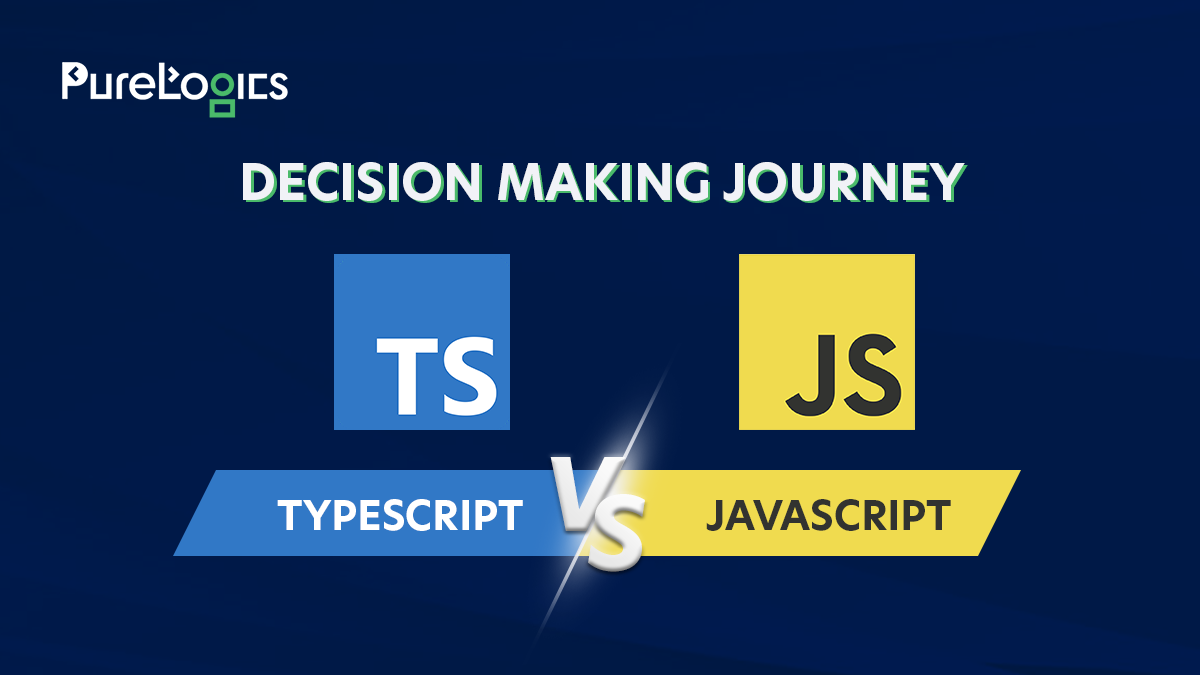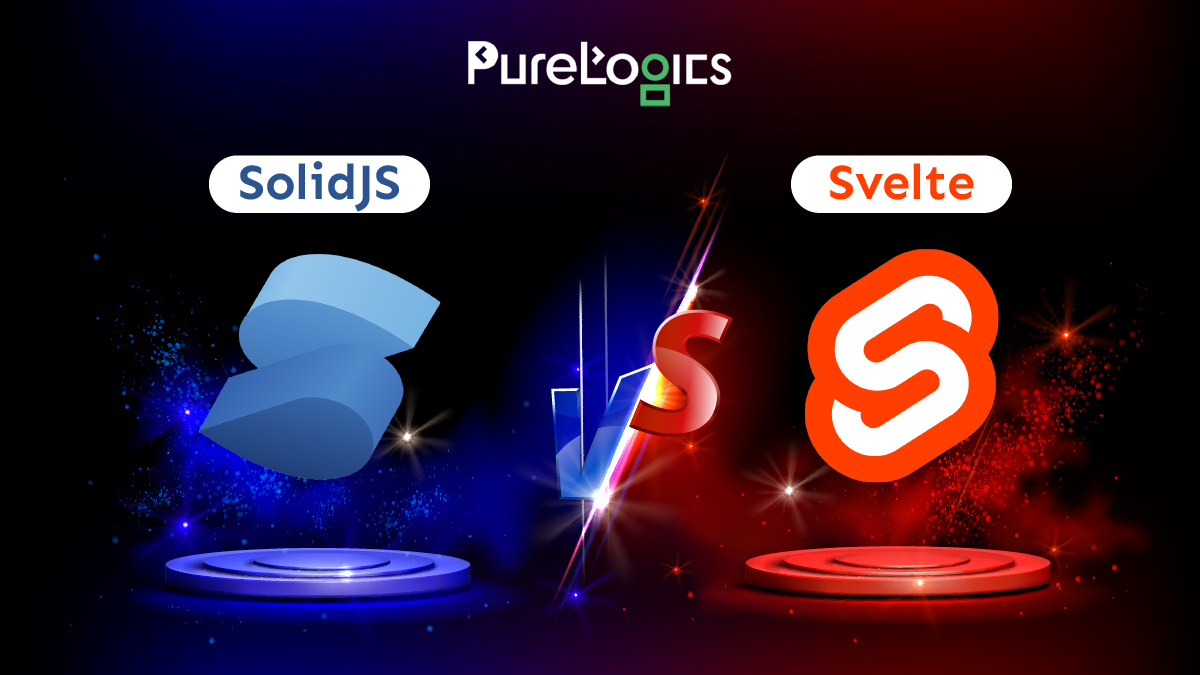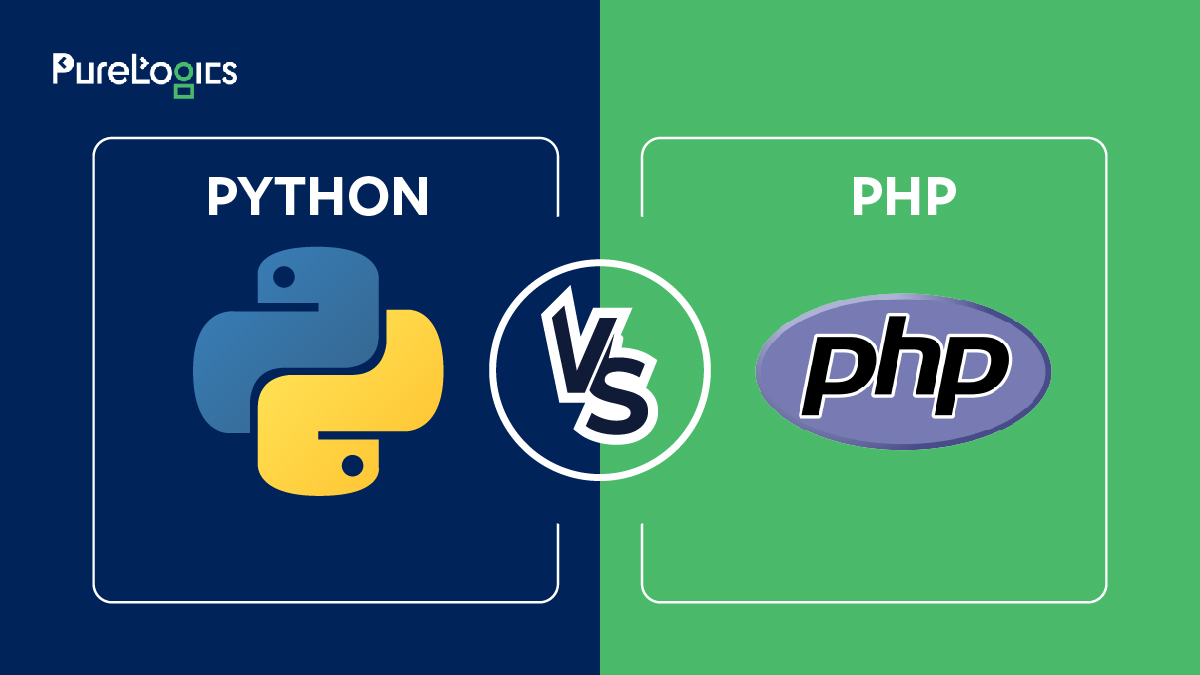TypeScript and JavaScript are two leading programming languages that have earned immense popularity in web application development. While JavaScript is a globally-used language that works as a catalyst for the web, TypeScript is an advanced version of JavaScript with a key differentiator (static typing) and many other optional features.
In this blog post, we’ll discuss the TypeScript vs JavaScript comparison in detail. We will also compare their strengths, weaknesses, performance, syntax, features, code examples, and learning curves.
Whether you’re an experienced developer or someone just starting out, this blog post is for you. Here you will get to know everything you need to know before deciding between both programming languages. By the end of it, you will have a better grasp of the differences between TypeScript and JavaScript.
Difference Between JavaScript and TypeScript
Let’s explore JavaScript and TypeScript and see what are the differences between them.
What is JavaScript?
JavaScript, often abbreviated as JS, is a popular programming language for web development. It is a versatile and powerful scripting language that is lightweight as well as cross-platform. The purpose of developing JS was to enhance the interactivity of web pages and make them more engaging and user-friendly.
JavaScript is a client-side scripting language. It means that this language runs in the web browser of the users. The programs in this language are called scripts. Developers write scripts in HTML pages and execute dynamic changes without requiring a page load.
What is JavaScript Used For?
JavaScript is used for a diverse range of purposes. Look at the following!
Enhancing user experience: You can use JavaScript to create dynamic web content, interactive website forms, and user-friendly interfaces.
Web development: JavaScript is the most famous and widely used technology to develop web applications. A developer knows that JS is a fundamental language for front-end development.
Server-side development: JavaScript is also used for server-side development if you use it with Node.js.
Game development: JavaScript also has its applications in game development. JavaScript frameworks like Phaser and Three.js are highly used among game developers.
Mobile app development: At present, React Native is the most trending and widely used JS framework. Software developers adore this framework due to its high-performance cross-platform mobile app development.
Pros of JavaScript
Following are some amazing pros of using JavaScript:
- JavaScript is a versatile programming language and is used for both front-end and server-side development.
- JavaScript has a vast and active community with a wealth of libraries and resources.
- The dynamic typing of JavaScript makes rapid development and prototyping.
- JavaScript’s browser compatibility allows it to run in all modern browsers with no additional setups.
- While using JS, errors are detected immediately during runtime.
Cons of JavaScript
- A lack of static typing can lead to runtime errors.
- It is prone to errors when handling large codebases.
- Compared to TypeScript, the tooling of JavaScript is less advanced.
- Security issues as the JS code is executed on the client side.
What is TypeScript?
TypeScript, often abbreviated as TS, was developed by Microsoft. It is an open-source pure and versatile object-oriented programming language. TypeScript is a premium superset of JavaScript which means that your every valid JS code will also be your TypeScript code.
TS requires a compiler to compile and create a JS file; it cannot be run directly in the browser. The TypeScript source file has a ‘.ts’ extension. Any authentic ‘.js’ file can be used by renaming it to a “.ts” file.
TypeScript is an advanced version of JavaScript with a key differentiator (static typing) that enhances the quality of code during development.
What is TypeScript Used For?
TypeScript serves various purposes. The following are some top applications of TypeScript:
- The first and foremost advantage of TypeScript is its static typing. It helps developers prevent runtime errors and write strong, high-quality code.
- TypeScript provides developers with enhanced tooling and intelligent code completion. It ensures a smooth and efficient process of development.
- TypeScript, the modern programming language, is easy to read and perform. Its high readability factor quickly understands and maintains code.
- TypeScript is particularly beneficial for large codebases and collaborative development, where type safety is really important.
Data Types of TypeScript
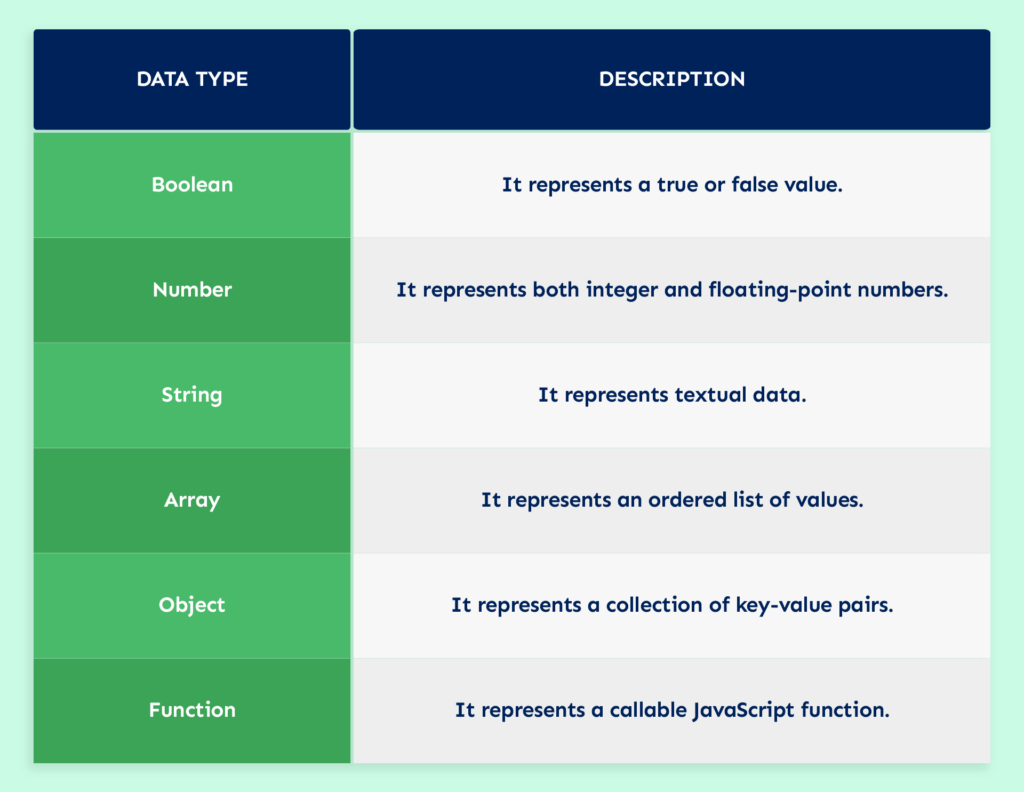
Features of TypeScript
Key features that set TypeScript apart from JavaScript are the following:
- Easy to use and maintain
- Increases project productivity
- Static typing and annotations are for improved code quality
- Easy to debug and timely detection of faults
- Full-fledged IDE support
- Supports object-oriented features such as interface, classes, and inheritance
- A strong module system for better organization of code
- TypeScript supports ES6 (ECMAScript) that has easier syntax and inheritance features
Pros of TypeScript: What Makes TypeScript an Excellent Option for Large Projects
Static typing: TypeScript is better than JavaScript because of its key differentiator, i.e., static typing. It helps developers catch errors at compile time.
Big projects: TypeScript is a good option when you deal with multiple files and features. It has automated testing that guarantees the stability of a large codebase.
Enhanced tooling: TypeScript provides you with powerful tooling features. It includes intelligent code completion and better refactoring support.
Accessibility: During front-end development, TypeScript easily identifies common accessibility errors, such as forgetting “alt text” on images.
Code readability: Type annotations make code more understandable, aiding collaboration and maintenance.
Rich IDE support: The development process of TypeScript is highly productive because of its better IDE support. It is supported by different Integrated Development Environments such as Visual Studio, Eclipse, WebStorm, etc.
Safety nets: TypeScript reduces common programming errors and leads to the development of high-quality, secure applications.
Cons of Using TypeScript Over JavaScript
- TypeScript needs a compilation step before execution. It may slow down the development process.
- Added extra time for transpiling requires a lot of extra time.
- Some developers say that TypeScript isn’t a true static typing programming language.
- TypeScript may not help you a lot when dealing with a small project.
Will TypeScript Replace JavaScript?
Well, a straightforward answer to this question is NO! TypeScript won’t replace JavaScript.
TypeScript is a totally different language except that it has the basic nature of JavaScript. Both programming languages have different purposes and strengths. Therefore, TypeScript won’t or can’t replace JavaScript.
JavaScript is an important programming language and technology in the industry of software development. Developers use it for both server-side and client-side development purposes.
On the other hand, TypeScript doesn’t work in web browsers directly. TypeScript trans compiles to JavaScript. Moreover, it is particularly for bigger projects that require strong typing and scalability.
TypeScript vs JavaScript: What’s the Actual Difference?
TypeScript and JavaScript are both programming languages, but they have key differences. JavaScript is a dynamically typed scripting language. Developers primarily use it for front-end web development. It’s versatile and runs in any browser which makes JavaScript an essential language for web development.
However, many developers claim that it lacks static typing. It often leads to runtime errors that can be challenging to catch during the development process.
On the other hand, TypeScript is a superset of JavaScript. It adds static typing and allows developers to catch errors during development rather than at runtime. This produces more strong and maintainable code. Also, TypeScript introduces features from future ECMAScript specifications.
So, you can say with confidence that TypeScript provides developers with the latest JavaScript features.
The TypeScript vs JavaScript code example is below. It will help you know the difference between both programming languages:
(JavaScript)
function add(a, b) {
return a + b;
}
console.log(add(2, ‘3’)); // Outputs: 23
(TypeScript)
function add(a: number, b: number): number {
return a + b;
}
console.log(add(2, ‘3’)); // Error: Argument of type ‘string’ is not assignable to parameter of type ‘number’.
In the TypeScript example, the static types stop passing a string to the add function. They catch the error at compile time rather than runtime. This is, for sure, a fundamental distinction that makes TypeScript a preferred choice.
TypeScript vs. JavaScript: Head-to-Head Comparison
Now, let’s understand the key differences in the below table on TypeScript vs JavaScript:
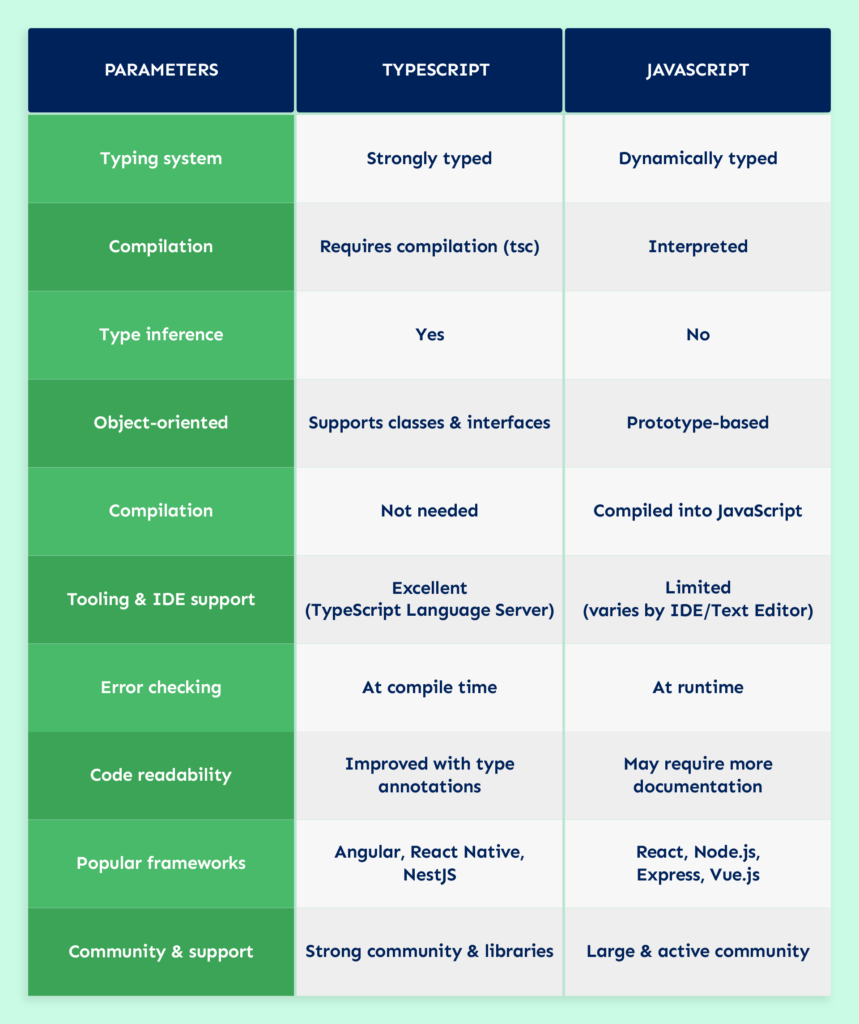
JavaScript or TypeScript: Final Remarks
JavaScript is suitable when you have a new team and they work on small web projects. However, if your team has expert developers and they have the knowledge and skills to handle a complex project, you must choose TypeScript as your programming language.
In addition to this factor, the choice between TypeScript and JavaScript also depends on the particular nature and requirements of your project.
We at PureLogics have been providing custom software development for the last 17+ years. We have successfully completed 1200+ web, mobile app, custom software development, AI/ML and product design projects.
If you need help in JavaScript, TypeScript, or any sort of software development, contact us. Discuss your business with us and let our best and brightest team transform your ideas into a successful digital reality.
PureLogics: We believe in logic, not magic!


 [tta_listen_btn]
[tta_listen_btn]
 November 20 2023
November 20 2023

